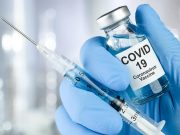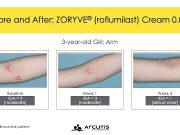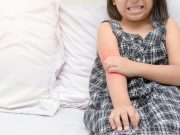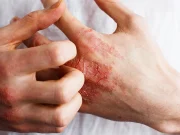Tag: Eczema
ACAAI: Eczema Onset, Severity Can Effect Child’s Ability to Outgrow Food Allergy
Onset of eczema between 4 and 6 months, greater severity, and longer duration linked to lower likelihood of outgrowing allergies
ACAAI: COVID-19 Vaccination Reduces Risk for Multiple Infections in Children With Atopic Dermatitis
Reduced risks seen for multiple infections and for allergic complications, including asthma, allergic rhinitis, contact dermatitis
ACAAI: Breast Implant Complications, Revision Surgery More Likely in Patients With Eczema
Patients with atopic diseases also have increased risks for complications, revision surgery after bone grafting
FDA Approves Zoryve for Atopic Dermatitis in Young Children
The once-daily cream can be used anywhere on the body and offers an alternative to steroids in children ages 2 to 5 years
FDA Approves Opzelura for Atopic Dermatitis in Children
It is the first topical JAK inhibitor approved in the U.S. for pediatric atopic dermatitis
Suicidal Ideation Risk Elevated for Patients With Atopic Eczema
Key predictors of suicidal ideation included younger age and obesity, as well as pruritus, skin pain, symptom intensity
Lebrikizumab Efficacious, Safe for Patients With Skin of Color, Eczema
64.4 percent of patients with postinflammatory hyperpigmented lesions at baseline experienced reduced hyperpigmentation at week 24
Novel Treatments Recommended for Management of Atopic Dermatitis in Adults
Strong recommendations presented for tapinarof cream, roflumilast cream, lebrikizumab, nemolizumab with concomitant topical therapy
FDA Approves First Cream for Treating Chronic Hand Eczema
Atopic Dermatitis May Be Linked to Increased Risk for CKD
Association between AD and increased risk for chronic kidney disease seen for men and women and in all age groups














